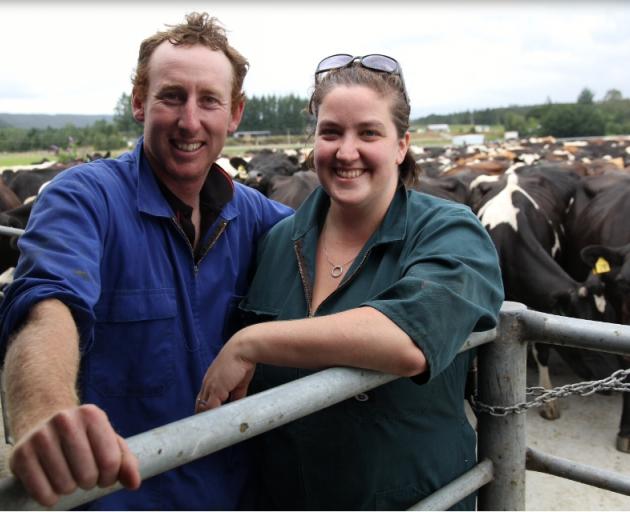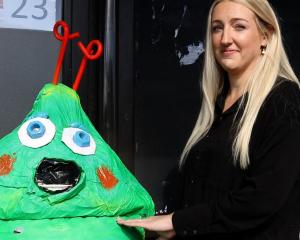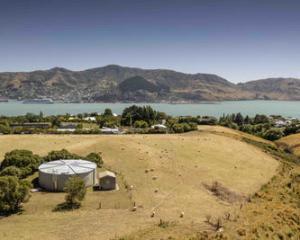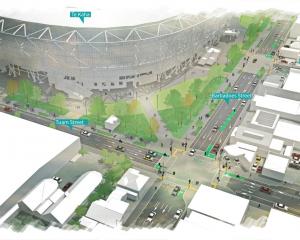
Siobhan O’Malley is a relatively new convert to dairy farming.
She, along with husband Christopher, decided to go dairy farming only after returning from their Irish OE in 2009.
Siobhan may have been green to living a rural lifestyle then, but has hit the ground running ever since, working on multiple farming opportunities.
The couple went sharemilking for the first time in 2011-12, and has worked on farms in Darfield, Oamaru, Grey Valley and Mid Canterbury. They have been running a hop garden and beef operation for the past 18 months in Tasman.
With their three children, Finnian (8), Aisling (6) and Ruairi (3), they recently moved to a 50-50 sharemilking operation milking 400 cows near Hokitika.
It’s a far cry from her Latin language and Classical studies at university and a former job teaching secondary school English.
“I grew up in Christchurch and had no connection to farming at all. I never stepped foot on to a farm until I met Christopher,” she says.
In Mid Canterbury the couple had a 50-50 sharemilking job on Thompsons Track, in Lauriston, from 2015 to 2018 which they “really enjoyed”.
Milking 500 cows for the first two years, the operation grew when they leased neighbouring land and, by their final year, were milking 600.
While in Mid Canterbury they faced a few challenges, including retaining good staff and putting up with the district’s infamous nor’west winds.
“Our first year as 50-50 sharemilkers was [on a different farm] at Thompsons Track and that was the year the payout went to $3.90.
But the district gave them a chance to be close to family in Christchurch and learn from those around them.
“We enjoyed being close to family in Christchurch and the range of farming types around us — we learned so much just looking over the fence at arable, potatoes, drystock and seed operations.
“A great community of farmers around us, many of whom are still our friends.
Over the years, Siobhan has been involved with Federated Farmers and Dairy Women’s Network.
“The Mid-Canterbury DWN is very strong and has been offering some great events recently that I wish I could have attended, but was a bit far away,” she jokes.
Being a member of the organisations gives a feeling of being connected to other people facing similar challenges in their businesses and lives.
“You can share ideas and solutions and also just have empathy from the people in the same boat.
‘‘But a big aspect to organisations like Feds is the information that gets passed along about upcoming policy changes and the repercussions of those, as well as being a voice for farmers with the decision makers in Wellington, and I think this is going to be more and more important,” she says.
The decision to take a break from dairy farming and explore other options took them to Tasman, where many of Siobhan’s extended family live. It was a opportune time.
Siobhan met fellow Meat the Need founder Wayne Langford, of Golden Bay, while on an industry board for dairy that gives feedback to Primary ITO. Living just an hour away from each other allowed them to meet and share ideas on projects.
“We both shared an interest in NZ farming on social media [he runs YOLOFarmer and I run Pukeko Pastures] so we had some good chats.”
“Wayne had thought of the concept behind Meat the Need after he dropped off some meat to his local foodbank and found out how long it would last.”
In six weeks of operation, Meat the Need donors have helped supply four months’ worth of meat to 37 foodbanks across the South Island.
“He worked out that if you could scale the supply across the country, this was a quantity that might actually be able to be supplied by farmers. So together we came up with a plan to make it happen,” she said.
The duo pitched the idea of a charitable nationwide supply chain and Silver Fern Farms got behind the idea quickly.
Using a “rural network of hidden talents” including a dairy farmer from Northland who did the branding and a farmer’s daughter who made the launch video with support from industry bodies such as Beef+LambNZ and DairyNZ, awareness of the programme has spread.
“The response has been immediate, wholehearted support in most cases,” she said.
“We had farmers donating through our website within the first 24 hours of launch, which we were very grateful for.
“In the first month approximately 125 animals were donated, and we are just getting started.”
All farmer donations went to foodbanks as mince, and sponsorship and public donations were sought to cover lean running costs.
Mince was the preferred choice of foodbanks as it was versatile for families, easier to store and cook, and could feed several people from one pack.
Siobhan would like to see Meat the Need grow, not only with ongoing donations from farmers, but also to include other primary sector products using a similar framework.
“For instance, I'd love to talk to Synlait about their farmers donating milk and them supplying baby formula, or Westland Milk Products or Fonterra supplying UHT milk,” she said.
Siobhan and Christopher have a long term goal to buy their own dairy farm and the West Coast has always been on their radar.
“We started talking about missing dairying before Christmas [in 2019], but thought we should do another year at hops just to really give it a good go and see two full annual cycles to harvest through.
“But when we both went to the West Coast to be judges for New Zealand Dairy Industry Awards in February ... we both came home fizzing, and realised that we love dairy farming, so why wait to go back to it? The kids are also thrilled to be headed back to dairy,” she said.
“We decided if we were going back dairy farming at all we should head to where we want to be long term and join the community.
“As it happens, Kokatahi (in Westland) is where Christopher’s grandfather received a farm in the ballot after World War 2.
‘‘Christopher grew up visiting the area a lot and his uncle's family still farm there.”
They are looking forward to learning how to farm successfully “where the irrigation falls out of the sky and is measured in metres”.
“It will be different from our farming systems in Mid Canterbury, so we need to go and learn from the neighbours and the high performing farmers in the district.
Siobhan said it was a bit like starting out again.
But they were aiming for success and in three to five years being in a better position to buy a farm in the area — and be confident running it.













